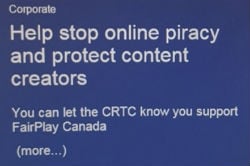 On June 2, 2017 a group of Canadian telecoms giants including Bell Canada, Bell ExpressVu, Bell Media, Videotron, Groupe TVA, Rogers Communications and Rogers Media, filed a complaint in Federal Court against Montreal resident, Adam Lackman.
On June 2, 2017 a group of Canadian telecoms giants including Bell Canada, Bell ExpressVu, Bell Media, Videotron, Groupe TVA, Rogers Communications and Rogers Media, filed a complaint in Federal Court against Montreal resident, Adam Lackman.
Better known as the man behind Kodi addon repository TVAddons, Lackman was painted as a serial infringer in the complaint. The telecoms companies said that, without gaining permission from rightsholders, Lackman communicated copyrighted TV shows including Game of Thrones, Prison Break, The Big Bang Theory, America’s Got Talent, Keeping Up With The Kardashians and dozens more, by developing, hosting, distributing and promoting infringing Kodi add-ons.
To limit the harm allegedly caused by TVAddons, the complaint demanded interim, interlocutory, and permanent injunctions restraining Lackman from developing, promoting or distributing any of the allegedly infringing add-ons or software. On top, the plaintiffs requested punitive and exemplary damages, plus costs.
On June 9, 2017 the Federal Court handed down a time-limited interim injunction against Lackman ex parte, without Lackman being able to mount a defense. Bailiffs took control of TVAddons’ domains but the most controversial move was the granting of an Anton Piller order, a civil search warrant which granted the plaintiffs no-notice permission to enter Lackman’s premises to secure evidence before it could be tampered with.
The order was executed June 12, 2017, with Lackman’s home subjected to a lengthy search during which the Canadian was reportedly refused his right to remain silent. Non-cooperation with an Anton Piller order can amount to a contempt of court, he was told.
With the situation seemingly spinning out of Lackman’s control, unexpected support came from the Honourable B. Richard Bell during a subsequent June 29, 2017 Federal Court hearing to consider the execution of the Anton Piller order.
The Judge said that Lackman had been subjected to a search “without any of the protections normally afforded to litigants in such circumstances” and took exception to the fact that the plaintiffs had ordered Lackman to spill the beans on other individuals in the Kodi addon community. He described this as a hunt for further evidence, not the task of preserving evidence it should’ve been.
Justice Bell concluded by ruling that while the prima facie case against Lackman may have appeared strong before the judge who heard the matter ex parte, the subsequent adversarial hearing undermined it, to the point that it no longer met the threshold.
As a result of these failings, Judge Bell vacated the Anton Piller order and dismissed the application for interlocutory injunction.
While this was an early victory for Lackman and TVAddons, the plaintiffs took the decision to an appeal which was heard November 29, 2017. Determined by a three-judge panel and signed by Justice Yves de Montigny, the decision was handed down Tuesday and it effectively turns the earlier ruling upside down.
The appeal had two matters to consider: whether Justice Bell made errors when he vacated the Anton Piller order, and whether he made errors when he dismissed the application for an interlocutory injunction. In short, the panel found that he did.
In a 27-page ruling, the first key issue concerns Justice Bell’s understanding of the nature of both Lackman and TVAddons.
The telecoms companies complained that the Judge got it wrong when he characterized Lackman as a software developer who came up with add-ons that permit users to access material “that is for the most part not infringing on the rights” of the telecoms companies.
The companies also challenged the Judge’s finding that the infringing add-ons offered by the site represented “just over 1%” of all the add-ons developed by Lackman.
“I agree with the [telecoms companies] that the Judge misapprehended the evidence and made palpable and overriding errors in his assessment of the strength of the appellants’ case,” Justice Yves de Montigny writes in the ruling.
“Nowhere did the appellants actually state that only a tiny proportion of the add-ons found on the respondent’s website are infringing add-ons.”
The confusion appears to have arisen from the fact that while TVAddons offered 1,500 add-ons in total, the heavily discussed ‘featured’ addon category on the site contained just 22 add-ons, 16 of which were considered to be infringing according to the original complaint. So, it was 16 add-ons out of 22 being discussed, not 16 add-ons out of a possible 1,500.
“[Justice Bell] therefore clearly misapprehended the evidence in this regard by concluding that just over 1% of the add-ons were purportedly infringing,” the appeals Judge adds.
After gaining traction with Justice Bell in the previous hearing, Lackman’s assertion that his add-ons were akin to a “mini Google” was fiercely contested by the telecoms companies. They also fell flat before the appeal hearing.
Justice de Montigny says that Justice Bell “had been swayed” when Lackman’s expert replicated the discovery of infringing content using Google but had failed to grasp the important differences between a general search engine and a dedicated Kodi add-on.
“While Google is an indiscriminate search engine that returns results based on relevance, as determined by an algorithm, infringing add-ons target predetermined infringing content in a manner that is user-friendly and reliable,” the Judge writes.
“The fact that a search result using an add-on can be replicated with Google is of little consequence. The content will always be found using Google or any other Internet search engine because they search the entire universe of all publicly available information. Using addons, however, takes one to the infringing content much more directly, effortlessly and safely.”
With this in mind, Justice de Montigny says there is a “strong prima facie case” that Lackman, by hosting and distributing infringing add-ons, made the telecoms companies’ content available to the public “at a time of their choosing”, thereby infringing paragraph 2.4(1.1) and section 27 of the Copyright Act.
On TVAddons itself, the Judge said that the platform is “clearly designed” to facilitate access to infringing material since it targets “those who want to circumvent the legal means of watching television programs and the related costs.”
Turning to Lackman, the Judge said he could not claim to have no knowledge of the infringing content delivered by the add-ons distributed on this site, since they were purposefully curated prior to distribution.
“The respondent cannot credibly assert that his participation is content neutral and that he was not negligent in failing to investigate, since at a minimum he selects and organizes the add-ons that find their way onto his website,” the Judge notes.
In a further setback, the Judge draws clear parallels with another case before the Canadian courts involving pre-loaded ‘pirate’ set-top boxes. Justice de Montigny says that TVAddons itself bears “many similarities” with those devices that are already subjected to an interlocutory injunction in Canada.
“The service offered by the respondent through the TVAddons website is no different from the service offered through the set-top boxes. The means through which access is provided to infringing content is different (one relied on hardware while the other relied on a website), but they both provided unauthorized access to copyrighted material without authorization of the copyright owners,” the Judge finds.
Continuing, the Judge makes some pointed remarks concerning the execution of the Anton Piller order. In short, he found little wrong with the way things went ahead and also contradicted some of the claims and beliefs circulated in the earlier hearing.
Citing the affidavit of an independent solicitor who monitored the order’s execution, the Judge said that the order was explained to Lackman in plain language and he was informed of his right to remain silent. He was also told that he could refuse to answer questions other than those specified in the order.
The Judge said that Lackman was allowed to have counsel present, “with whom he consulted throughout the execution of the order.” There was nothing, the Judge said, that amounted to the “interrogation” alluded to in the earlier hearing.
Justice de Montigny also criticized Justice Bell for failing to take into account that Lackman “attempted to conceal crucial evidence and lied to the independent supervising solicitor regarding the whereabouts of that evidence.”
Much was previously made of Lackman apparently being forced to hand over personal details of third-parties associated directly or indirectly with TVAddons. The Judge clarifies what happened in his ruling.
“A list of names was put to the respondent by the plaintiffs’ solicitors, but it was apparently done to expedite the questioning process. In any event, the respondent did not provide material information on the majority of the aliases put to him,” the Judge reveals.
But while not handing over evidence on third-parties will paint Lackman in a better light with concerned elements of the add-on community, the Judge was quick to bring up the Canadian’s history and criticized Justice Bell for not taking it into account when he vacated the Anton Piller order.
“[T]he respondent admitted that he was involved in piracy of satellite television signals when he was younger, and there is evidence that he was involved in the configuration and sale of ‘jailbroken’ Apple TV set-top boxes,” Justice de Montigny writes.
“When juxtaposed to the respondent’s attempt to conceal relevant evidence during the execution of the Anton Piller order, that contextual evidence adds credence to the appellants’ concern that the evidence could disappear without a comprehensive order.”
Dismissing Justice Bell’s findings as “fatally flawed”, Justice de Montigny allowed the appeal of the telecoms companies, set aside the order of June 29, 2017, declared the Anton Piller order and interim injunctions legal, and granted an interlocutory injunction to remain valid until the conclusion of the case in Federal Court. The telecoms companies were also awarded costs of CAD$50,000.
It’s worth noting that despite all the detail provided up to now, the case hasn’t yet got to the stage where the Court has tested any of the claims put forward by the telecoms companies. Everything reported to date is pre-trial and has been taken at face value.
TorrentFreak spoke with Adam Lackman but since he hadn’t yet had the opportunity to discuss the matter with his lawyers, he declined to comment further on the record. There is a statement on the TVAddons website which gives his position on the story so far.
Source: TF, for the latest info on copyright, file-sharing, torrent sites and more. We also have VPN discounts, offers and coupons

from TorrentFreak http://ift.tt/2EHu5By
via
IFTTT
 Following complaints from Disney, 20th Century Fox, Paramount, Sony, Universal and Warner, a court in Spain recently ordered local ISPs to block HDFull.tv and Repelis.tv, a pair of popular pirate sites.
Following complaints from Disney, 20th Century Fox, Paramount, Sony, Universal and Warner, a court in Spain recently ordered local ISPs to block HDFull.tv and Repelis.tv, a pair of popular pirate sites. For the past few hours, Chrome and Firefox users have been unable to access Torrentz2.eu without running into a significant roadblock.
For the past few hours, Chrome and Firefox users have been unable to access Torrentz2.eu without running into a significant roadblock.
 Last month, a coalition of Canadian companies
Last month, a coalition of Canadian companies 


 About a year ago we first heard about
About a year ago we first heard about 
